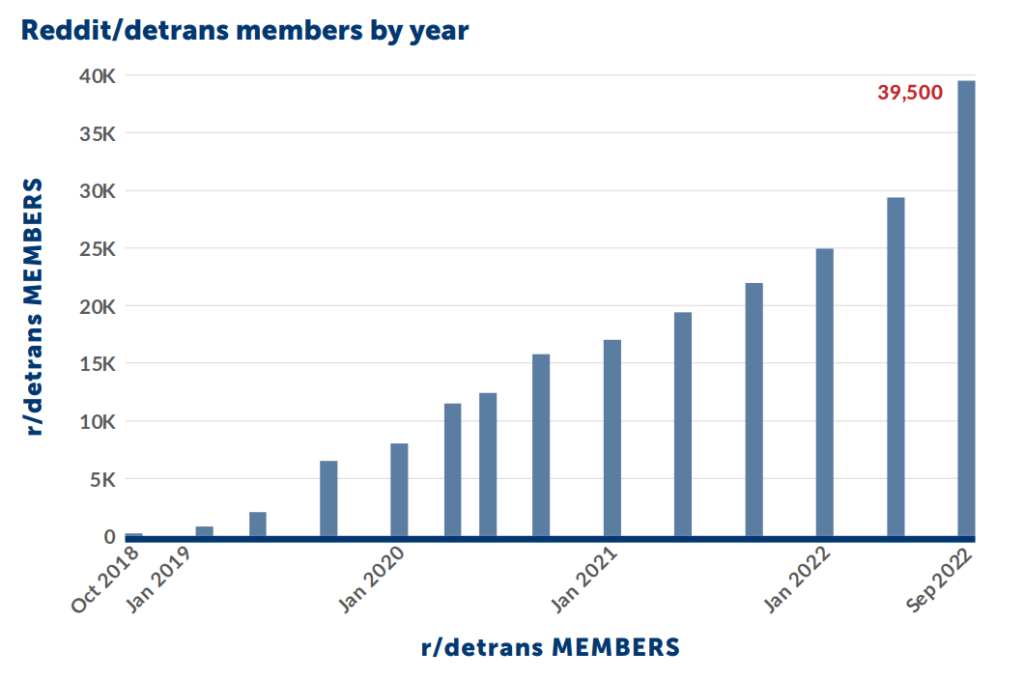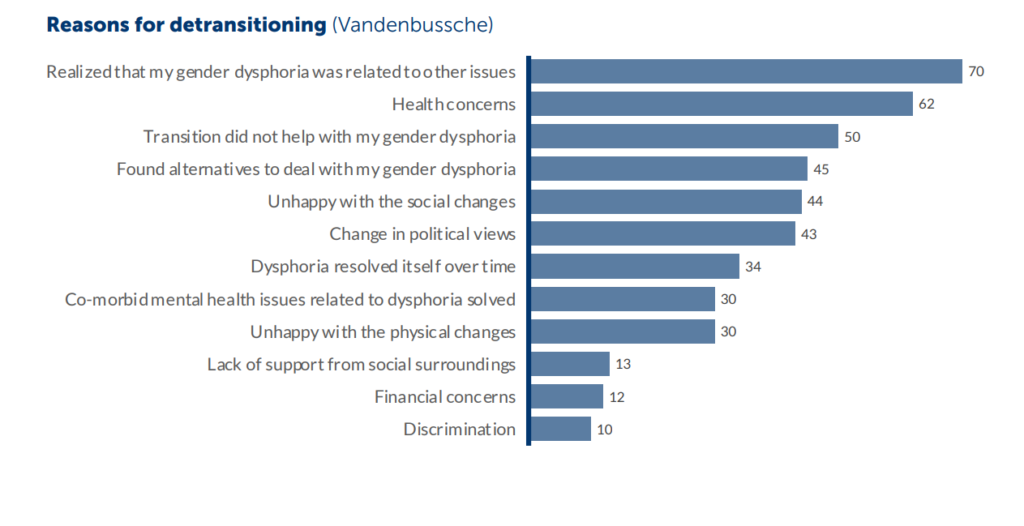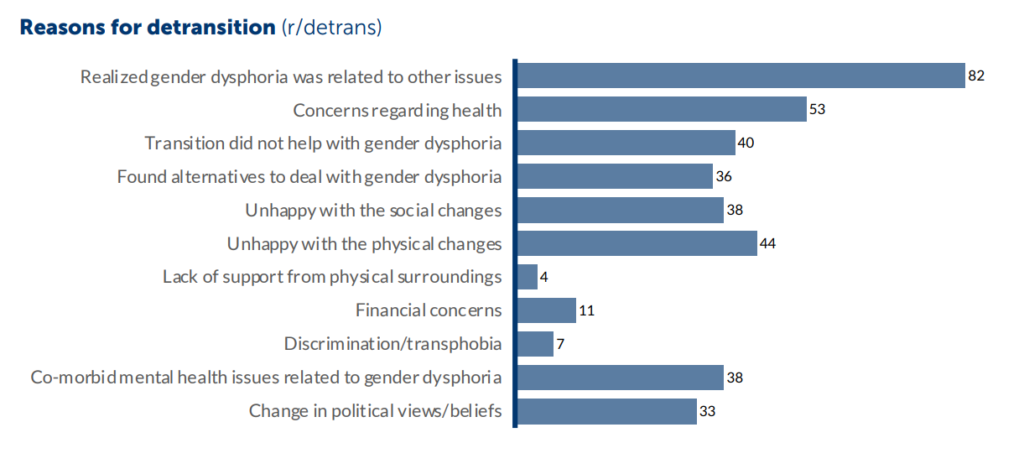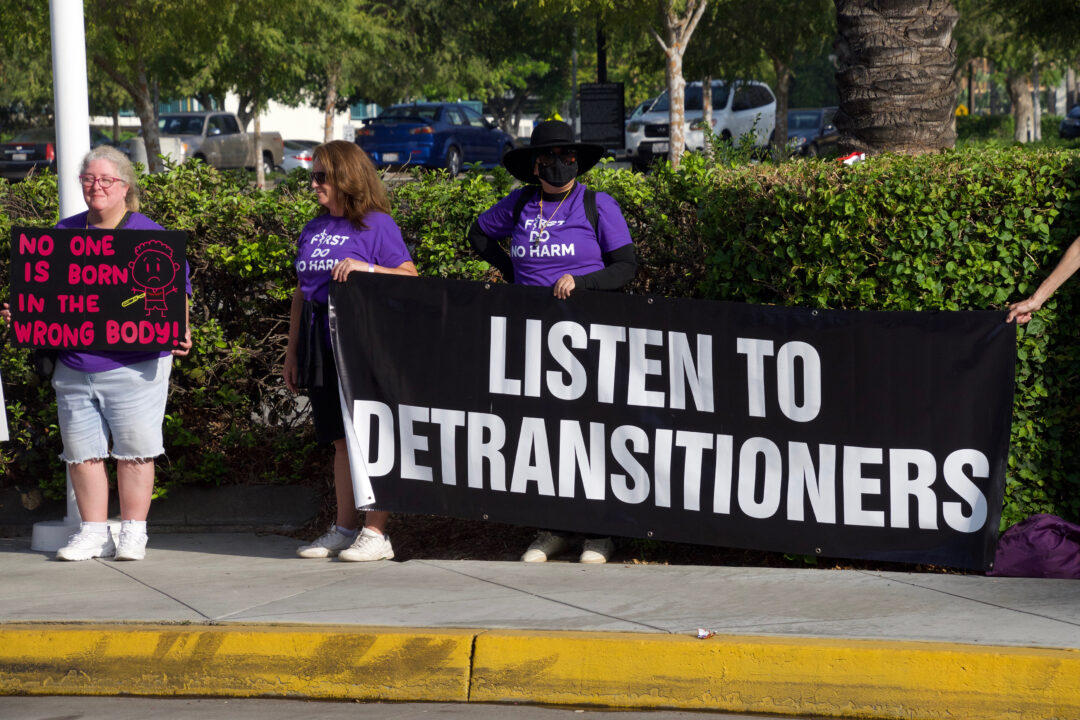How Many People Regret Transitioning and Why
No one knows how many experience transition regret because no one is tracking patients, but there are indications of growing numbers… and the reasons for regret are telling.
- A detransitioner is someone who identified as trans, nonbinary, or another gender identity but then regrets the medical interventions and re-identifies with their natal sex.
- A desister is someone who identified as transgender but stopped identifying before medicalizing.
- There are also people who regret transitioning without detransitioning, sometimes because they feel it would be too hard to detransition.
“my chest is maimed with heavy scarring. I miss being feminine. From the second I woke up in the operating room I knew it was a mistake. I was so sure of my identity. I’m realizing I was just lost and in over my head.”
Female detransitioner, hormones and double mastectomy at 15
What We Know About Regret
- Studies show that 80% to 88% of pre-pubescent children who believe that they should be the opposite sex, but do not socially transition (change name, pronouns and outward appearance) would grow up to be comfortable with their unaltered, natal bodies. A large portion are same sex attracted.
- Recent studies show that most people detransition within 4-6 years of transitioning.
- Reddit/Detrans, a platform for those questioning transition was created in November 2017. In the last 6-months, an average of 60 new subscribers join every day. While not every member is a detransitioner and not all detransitioners join, the significant growth indicates rapid increase and interest in detransitioners.


“My parents were told the options were transition or suicide. They complied. My distraught parents wanted me alive.”
Chloe Cole, 18-year-old female detransitioner, Puberty blockers, cross-sex hormones, and double mastectomy at age 15
Misinformation About Regret
Many physicians quote a 1% regret rate. This statistic is based on The Amsterdam Cohort of Gender Dysphoria Study (1972-2015): Trends in Prevalence, Treatment, and Regrets. This study had significant limitations and cannot be used as a baseline for the current cohort:
- All study participants were adults and those who had significant pre-pubescent gender dysphoria.
- Definition of “regret” excludes most detransitioners. The study included:
- ONLY those who had their testes or ovaries removed
- ONLY those who resumed natal sex hormones
- ONLY those who returned to original medical provider — most don’t inform their original provider that they detransitioned
- The study DID NOT INCLUDE:
- those who committed suicide or those who died as a result of gender treatment complications
- those who regret puberty blockers, cross-sex hormones, mastectomy or breast augmentation
- 20% were lost to follow-up
Why People Detransition
Due to the lack of patient follow-up, the reasons for detransition are largely unknown, but three recent studies shed some light on the subject:
Individuals Treated for Gender Dysphoria with Medical and/or Surgical Transition Who
Subsequently Detransitioned: A Survey of 100 Detransitioners (Littman), found:
- The majority (55%) felt that they did not receive an adequate evaluation from a doctor or mental health professional before starting transition.
- Nearly half (46%) said counselors over-promised the benefits and about one quarter (26%) said counselors minimized the risks. Counselors were much more likely to encourage than to urge caution about medical transition.
- 76% of respondents did not inform their clinicians that they had detransitioned, which has lead to a tremendous underestimate of the number of individuals with regret.
For both males and females, the most common reason for detransitioning was that the person became more comfortable identifying as their natal sex.

Detransition-Related Needs and Support: A Cross-Sectional Online Survey, Journal of
Homosexuality (Vandenbussche), found:
- 45% reported they were insufficiently informed about health risks before starting medical transition or other interventions.
- Most detransitioners had comorbidities — over half (54%) had 3+ comorbidities, 69% reported depression, 63% anxiety, and 33% post-traumatic stress disorder.
The most common reported reason for detransitioning was realizing that gender dysphoria was related to other issues (70%); the second was health concerns (62%), followed by transition not helping with dysphoria (50%).

“After years of struggling with gender dysphoria, along with diagnosed anorexia, bulimia, anxiety, and depression, I thought that pursuing medical transition and living as the opposite sex would bring me happiness. I believed what trans activists told me: that transitioning was my best option and the only way to prevent suicide.”
Cat Cattinson, adult female detransitioner,
Cross-sex hormones
The 2022 r/detrans Demographic Survey also asked about reasons for detransitioning.

While each of these studies has limitations, all three found similar primary reasons for regret.
Though often claimed as the main reason for detransition, despite different samples and questions, none found that discrimination or lack of support was a major reason for detransitioning.


